Supreme Court

IN 2006, A MAJORITY of Michigan voters amended their state constitution to outlaw the use of race in college admissions. Supporters of affirmative action challenged that amendment in court; in April, the U.S. Supreme Court (in a case known as Schuette vs. Coalition to Defend Affirmative Action) affirmed Michigan’s right to ban the use of affirmative action by public universities.
Justice Sonya Sotomayor issued a 58-page dissent with a blistering critique of the court’s ruling. Sotomayor pointed out the illogic of the majority opinion that the case was about the voters’ right to self-governance. “This case,” she wrote, “is about how the debate over the use of race-sensitive admissions policies may be resolved ... that is, it must be resolved in constitutionally permissible ways.”
Sotomayor explained in her dissent that “by permitting a majority of the voters in Michigan to do what our Constitution forbids, the Court ends the debate over race-sensitive admissions policies in Michigan in a manner that contravenes constitutional protections long recognized in our precedents.” In other words, if we allow the majority to rule without limits, then affirmative action is effectively dead.
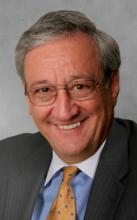
The great rejoicing after the U.S. Supreme Court’s recent ruling on public prayer reminded me of the infamous line from an officer who commented on the destruction of a village during the Vietnam War: “We had to destroy the village in order to save it!”
There isn’t much to celebrate in the high court’s decision in Greece v. Galloway to allow sectarian prayers to be spoken in all kinds of public meetings. The big loser in this judicial decision was prayer itself — its uniqueness and its authenticity.

On April 14, the school board in Mustang, Okla., voted to institute an elective Bible course. This is not news. More than a thousand U.S. public schools offer Bible as literature courses.
In March, Hobby Lobby argued before the Supreme Court for a religious liberty exemption to the Affordable Care Act. Now Green is promoting the Bible curriculum the Mustang school board just adopted — a curriculum he predicts will soon be adopted in hundreds, perhaps thousands, of American public schools.
IN ITS SEEMINGLY endless quest to attack the few remaining pillars of our campaign finance laws, the Supreme Court issued a brazen ruling in McCutcheon vs. FEC, striking down the aggregate contribution limits that capped the overall amount individuals could give to candidates and political parties each election cycle. As it was with Citizens United—the 2010 decision that said corporations and unions could spend unlimited amounts—the court’s April ruling was striking not only in its naiveté about the effect of money in politics, but in its naiveté about the nature of the American experiment itself.
Whereas Citizens United focused on the nature of corporate spending in elections, this decision cuts straight to the chase. Should wealthy people have a greater ability to fund political parties and candidates—and benefit from the greater access and influence that awards them? The court sent a clear message about where it stands: Yes, they should. Chief Justice John Roberts, writing for the majority, even cloaked the decision in pious language, stating, “if the First Amendment protects flag burning, funeral protests, and Nazi parades ... it surely protects political campaign speech despite popular opposition.”
Traditionally the court has asserted that the government has an interest in preventing corruption and the appearance of corruption, the latter in order to sustain public faith in the democratic process. However, the McCutcheon decision defines “corruption” so narrowly that the original statute is essentially useless. The government can no longer prevent the appearance of corruption, and it would have a difficult time proving “quid-pro-quo corruption” occurred in the first place
But despite this disheartening fact, there’s a glimmer of hope. One of the unintended effects of Citizens United was that it created a major “teachable moment” for the public about campaign finance—an issue that had previously gained little attention and was easily misunderstood.
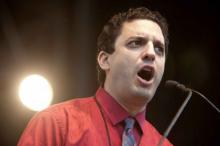
This week’s Supreme Court ruling allowing sectarian prayers at public meetings dealt a body blow to atheist organizations.
That was the assessment of David Silverman, president of American Atheists, speaking Tuesday to a group of nonbelievers at Stanford University. He then described a scenario that may raise eyebrows among some atheists: working with religious groups to fight against the ruling.
That’s a change for a man who has famously described religion as a “poison.” And it is emblematic, observers say, of the change that may result from the majority opinion in Greece v. Galloway, which found that prayers citing “the blood sacrifice of Jesus Christ” are permissible before government business.
Other secularists are likewise convinced that now is the time for atheists to join forces with members of minority faiths.
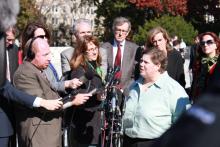
The Supreme Court Monday declared that the Constitution not only allows for prayer at government meetings, but religious prayer.
“To hold that invocations must be non-sectarian would force the legislatures sponsoring prayers and the courts deciding these cases to act as supervisors and censors of religious speech,” Kennedy wrote for himself and the conservatives on the court.
Lawmakers and judges would otherwise have to police prayer, he wrote, involving “government in religious matters to a far greater degree than is the case under the town’s current practice of neither editing nor approving prayers in advance nor criticizing their contact after the fact.”
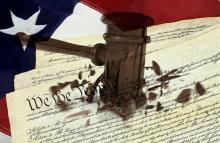
It started when the United States Supreme Court determined that corporations were people and, as such, had similar rights and protections as us oxygen-breathing types. And now, in another recent decision, the court has decided that people (individual human beings or corporations) have the right to donate to an unlimited number of political candidates — therefore removing the aggregate cap on total donation amounts — as such gifts should be protected as an exercising of free speech, as defined in the constitution.
So much for representative democracy.
It’s my understanding that the founders of our nation and the framers of our constitution held the notion of representative democracy fairly sacred.
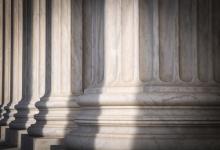
Yesterday, the Supreme Court struck down a law that limited the amount of money that an individual can contribute to political campaigns in a two-year election cycle, while upholding the limit that an individual can give to a single campaign in the same period. Previously, the law limited total individual contributions to all political campaigns to $48,600, while capping individual donations to a single campaign at $2,600.
The bottom line of yesterday's McCutcheon v. Federal Election Commission ruling is that there will be more money in politics, as the Court doubles down on the controversial 2010 Citizens United v. Federal Election Commission ruling that allowed unlimited, anonymous expenditures by outside groups on election activities. Those with resources can now contribute up to $2,600 in all 435 congressional districts, more than 30 Senate races, and the presidential election, while at the same time giving millions more to Super PACs in support of these candidates.
The ruling will give more influence to corporate and labor lobbyists whose groups contribute to political campaigns. It is still illegal to give a donation that explicitly requests a legislative action in return for the contribution. But while politicians spend hours every week making phone calls soliciting contributions, they aren’t likely to forget who is funding their political future. When they hang up the phone and meet a lobbyist in their office whose group is funding their campaign, there is an unspoken understanding that the politician will be more open to the idea that lobbyist is presenting.


Today, the Supreme Court heard two cases that have major implications for the intersection of religious liberty and health care in America. While Sebelius v. Hobby Lobby Stores and Conestoga Wood Specialties Corp. v. Sebelius were argued before the Court, hundreds of activists voiced their opinions outside the Court’s chambers.
The Court will decide whom the so-called “contraception mandate” law in the Affordable Care Act applies to. Both of the challengers to this section of the 2010 health law say that providing certain forms of birth control violates their sincerely held religious views. Though there are already exemptions in law for churches and some nonprofits, this case will decide whether for-profit corporations are offered protection under the religious liberty clause of the First Amendment to deny contraception coverage to their employees.

SEVERAL YEARS AGO, before Congress passed the Affordable Care Act, many people were clear on the need to get health care for our brothers and sisters and joined in the push to reform the delivery system for health care in this country. When it was enacted, we were thrilled that those who had such difficulty getting even the most basic care for themselves and their children would finally have some health security.
But the notorious website problems—including the crashes, the inability to access it, the insurance programs that have been canceled, and the smaller-than-expected number of people who have been enrolled—have frustrated, discouraged and sometimes challenged us. This has been complicated by political bombast and in some cases, sadly, vicious character assassinations.
As people of faith, it is important not to be swept up in these problems, but to relentlessly pursue access to health care for the 48 million people who do not have health insurance today. We also need to remember that the ACA is more than a website. Think of the millions of young adults who can now stay on their parents’ insurance and the thousands of small businesses that have received tax credits for providing insurance to their employees.
The new rules that guarantee comprehensive insurance coverage, no barriers to preventive care, no pre-existing condition limits, and no lifetime limits on coverage have already made a huge difference in the lives of many families. The portion of the law that requires insurance companies to spend 80 to 85 percent of premium revenue on actual care rather than profits or dividends to shareholders will do much to make the cost of insurance more reasonable.

Arriving home from school on Jan. 22, 1973, Mary Wissink noticed her mother was unusually animated.
The dining room table was pulled away from the wall for a festive meal. The linens were ironed. The smell of turkey, dressing, and sweet potatoes wafted through the house. Mom was polishing the silver.
Wissink, then a sophomore in high school, realized her mother had come home from work early to prepare a feast.
“Mary,” her mom said, “today you have the right to your own body.”
It was the day the U.S. Supreme Court affirmed the legality of a woman’s right to an abortion. Wissink and her family have been celebrating Roe v. Wade anniversaries ever since.
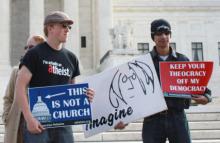
The Supreme Court struggled Wednesday with a case that asks whether government bodies can open with prayers that some people find overly religious and excluding.
From their lines of questioning, it’s unclear whether the court is ready to write new rules on what sort of prayer falls outside constitutional bounds. And more than one of the justices noted that just before they took their seats, a court officer declared: “God save the United States and this honorable court.”
Few court watchers believe the justices will rule all civic prayers unconstitutional — the nation has a long history of convening legislative bodies with such language.
Rather, the question raised by Town of Greece v. Galloway is how sectarian these prayers can get.

A group of Catholic monks can continue selling their handmade caskets after the U.S. Supreme Court declined to hear an appeal from Louisiana funeral directors.
“We really can now move forward without worrying about being shut down,” said Deacon Mark Coudrain, manager of St. Joseph Woodworks in Covington, La. “This is going to affect a lot of other people. A lot of people are going to have opportunities to do things that are their legal right to generate revenue.”
In a little-noticed ruling on Oct. 15, the Supreme Court declined to hear the case between the brothers of St. Joseph Abbey and the Louisiana State Board of Embalmers and Funeral Directors.
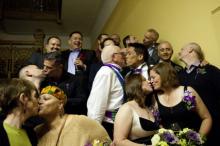
Gov. Chris Christie announced Monday that he was dropping the fight against same-sex marriage in New Jersey by withdrawing his appeal of a major case that was being heard by the state Supreme Court.
Starting one minute after midnight, gay couples have been getting married after the Supreme Court refused on Friday to delay the first weddings while it heard Christie’s appeal of a lower-court ruling that legalized gay marriage last month.
Christie said the court, in rejecting his plea for a stay, had made strong statements that settled the larger case.
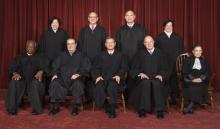
After two blockbuster terms in which it saved President Obama’s health care law and advanced the cause of same-sex marriage, the Supreme Court appears poised to tack to the right in its upcoming term on a range of social issues, from abortion and contraception to race and prayer.
The justices, whose term begins Monday, could rule against racial minorities in two cases and abortion rights in one or two others. They also could uphold prayers at government meetings, ease restrictions on wealthy political donors, strike down federal environmental regulations, and take a first bite out of Obamacare.

Federal officials have asked the U.S. Supreme Court to review the government mandate that private companies offer employees birth control coverage despite the business owner’s moral objections, with the company at the center of the suit owned by billionaire evangelical Christians.
Hobby Lobby’s lawsuit has been one of the most high profile of 60-some cases involving the Obama administration’s contraceptive mandate. The arts and crafts chain was founded by David Green, whom Forbes called “the biblical billionaire backing the evangelical movement.”
In June, the Obama administration issued final rules for the mandate that requires most employers to provide contraception at no cost. While there are exemptions for religious groups and affiliated institutions, there are no carve-outs for private businesses with religious owners.
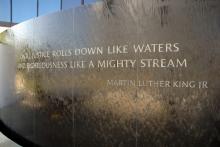
I was born in 1969 and thus am in the first generation of African-Americans to grow up with laws and policies that say to the rest of America that I am equal. I saw housing opportunities open up for me as my parents “broke the block” and became the first African-Americans to move onto an all-white block in the East Mt. Airy section of Philadelphia in 1970. I saw educational opportunities open up such that I was able to attend a nearly all-white private, college-prep high school in the suburbs. This was the fruit of the Civil Rights movement in my life growing up in the 1970s and 80s.
Soon hundreds of thousands will gather on the National Mall to commemorate the 50th anniversary of the March on Washington for Jobs and Freedom where the Rev. Dr. Martin Luther King gave his iconic “I Have a Dream” speech. That speech lived on for me in classrooms and in speech competitions and was etched on my heart so that I would carry that dream into the future.
The recent decisions by the U.S. Supreme Court to gut the enforcement section of the 1965 Voting Rights Act and the decision of the jury in the George Zimmerman trial have left me wondering about the dream, worried that it is under attack and worries that professed Christians are among those helping lead those attacks.
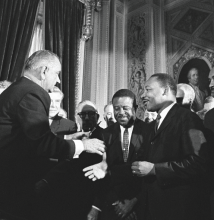
BACK IN THE day, when Stevie Wonder was Wishing “those days could come back once more,” my 6-, 7-, and 8-year-old friends and I had no idea what the heck he was talking about, but we loved the groove and would blast Wonder’s Songs in the Key of Life album from our front steps as we played in front of my house in our West Oak Lane neighborhood of Philadelphia.
Sometimes the boys would coast down the street on handmade skateboards, literally made of old skates—the kind with wheels you strapped to your shoes—nailed to short wooden planks. Sometimes the girls and boys would race each other down a steep street, flying at lightning speed on bikes and boards, to see who could make it first to the candy shop at the bottom of the hill. And sometimes, in all the play, a verbal sparring match would break out:
“You so big,” one friend would say, “it take two showerheads to clean yo big butt in the morning!” Then the 7-year-old sparring partner would come back: “Oh, yeah?! You so ugly, yo mama say ‘What dat?’ when she give birth to you!”
It would keep going and we’d all laugh out loud until someone got inappropriate. Usually inappropriateness began with three words: “Yo mama so ...” We all knew to never bring someone’s mother into the sparring match unless you wanted to fight for real. Those were fighting words.
This summer the Supreme Court got inappropriate. They spewed fighting words on the playground that is our national public square.

THIS SUMMER, two Supreme Court outcomes dramatically affected the reality of the words “Equal Justice Under Law.” In the first, a key component of the historic Voting Rights Act of 1965 was struck down, jeopardizing equal justice under the law especially for black, Latino, and low-income people whose voting rights have historically been assaulted and have continued to be suppressed as recently as the 2012 election. Efforts to increase barriers to voting for people of color, especially those with lower incomes, are already underway in several states. The Supreme Court’s decision was morally shameful.
The decision revealed how politically partisan this bench has become. The conservative justices have aligned themselves with the extreme right-wing politics that has taken over today’s Republican Party—one that has deliberately encouraged and practiced voter suppression against minorities, low-income people, the young, and the elderly.
America has made great progress on racial justice because of the tireless and courageous efforts of many. But the illusory idea of a “post-racial” America is exposed as a lie by this nation’s criminal justice system, the many recent attempts at racially based voter suppression, and now this decision by the Supreme Court.